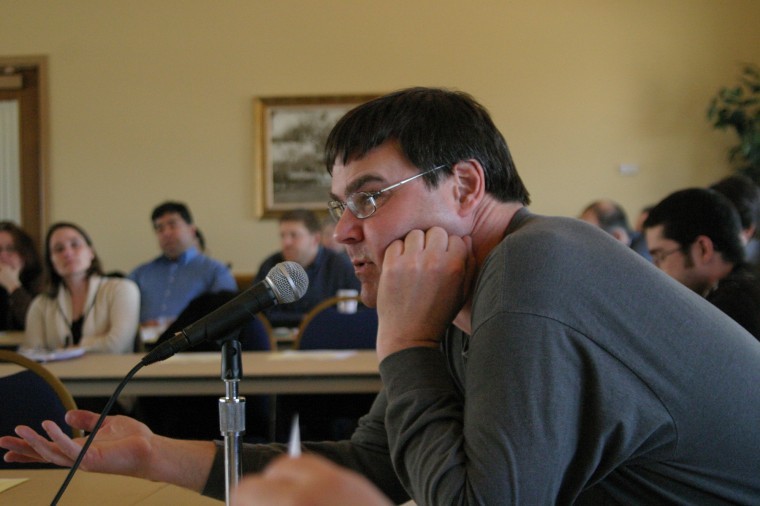Faculty Senate discusses online professor evaluations
Nicole Gault | Northern Star Christopher Nissen, a professor in the Foriegn Language department, speaks up about making student evaluations online rather then on paper at the Faculty Senate meeting Wednesday afternoon.
March 30, 2011
The Faculty Senate discussed the value of online student evaluation of instruction Wednesday afternoon.
Faculty Senate President Alan Rosenbaum said there are a number of colleges that are requiring all student evaluations be done online as oppose to the in-class paper and pencil format.
“In those colleges, we’ve been getting reports from faculty members that the return rate is very low, so somewhere around 25-30 percent of students seem to be filling those in,” he said.
Rosenbaum said there isn’t much data yet on the return rates of those online evaluations and whether or not those students who are filling them out are representative of the class as a whole.
“We do know that a number of un-tenured faculty are concerned that this is something that weighs heavily on their tenure decision, and it’s being based on a relatively low number,” he said.
Earl Hansen, associate professor of engineering technology, brought up his concern about the value of online evaluations.
“I found it very absurd that only two people would respond electronically to some professors, and there’s no way we can draw any conclusions positive or negative about that,” he said. “I think we got more accurate ratings-whether they were biased or not biased one way or another-when we did it with paper and pencil.”
Sonya Armstrong, assistant professor of literacy education, said some suggested benefits to online evaluations are that there would be a huge cost savings toward people-hours actually typing up the students’ comments and the evaluations would get back to faculty quicker.
After discussion, it was decided that the Academic Affairs Committee would be responsible for looking into online evaluations further.
The Committee on Resources, Space and Budgets Reports stated after NIU recently concluded testimony before the House and Senate appropriations committees in Springfield and based on feedback from those hearings, it appears that in Fiscal Year 2012 NIU could have a level budget at best.
The report also stated that NIU President John Peters is working with other state higher education institutions to put together a committee to look at pension issues and develop proposals that cut costs but do not significantly diminish benefits.
Peters is also appointing an ad-hoc pension advisory committee, comprised of faculty, staff and annuitants, according to the report.
George Slotsve, Faculty Rights and Responsibilities Committee member, presented the proposed Guests in Class Policy to the Senate.
The policy consists of three sentences and would give the instructor the power to approve of any guests in the classroom. It also states instructors should take into consideration the effect the guest will have on the learning environment when deciding if they would be an appropriate guests. It would also limit the individuals in the classroom to the instructor of record, students registered for class and individuals invited by the instructor.
Rosenbaum said since there is no policy on record, the Faculty Senate wanted to be proactive by creating the policy that says it’s up to the instructor to combat issues that may arise if an instructor denies a guest and it’s challenged.
Nancy Castle, professor of Allied Health & Communicative Disorders, brought up concern about whether or not the faculty member would be more liable if the guest was injured by agreeing to the guest being in class. After discussion, the proposed policy will be brought to the University Council for consideration and approval.













